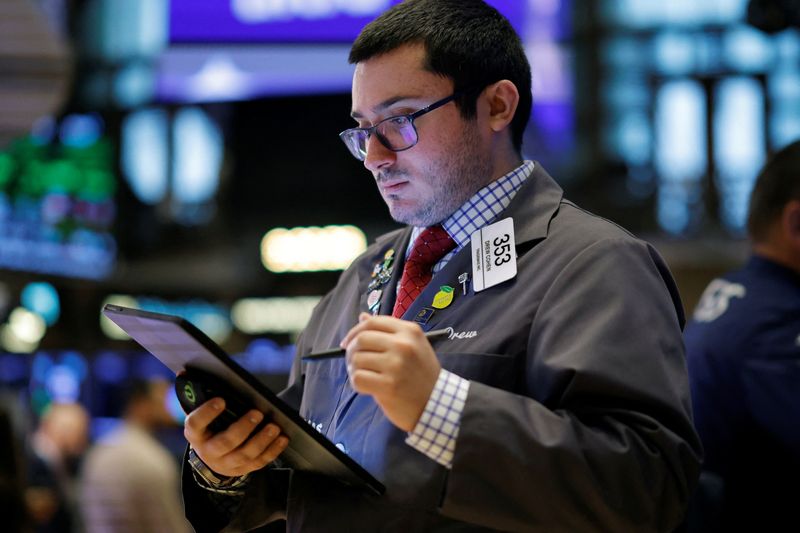By Chibuike Oguh
NEW YORK (Reuters) -Global stocks registered a strong weekly gain on Friday while U.S. Treasury yields slipped as markets eyed President-elect Donald Trump's likely policies and their impact on the U.S. economy, even as bitcoin traded near the $100,000 threshold.
Traders are bracing for Trump's agenda after he takes office in January, which is expected to include tariffs, tax cuts and deregulation. Trump has been nominating senior officials in his administration, and markets are awaiting his pick for Treasury secretary.
All three Wall Street indexes finished higher and each notched a weekly gain. Industrials, consumer discretionary, financials and consumer staples drove gains while communication services, utilities and technology equities were the biggest losers.
Nvidia (NASDAQ:NVDA), the world's most valuable company, ended down 3.2% after the artificial intelligence chipmaker reported strong quarterly results but issued lacklustre sales forecasts.
The Dow Jones Industrial Average rose 0.97% to 44,296.51, the S&P 500 rose 0.35% to 5,969.34 and the Nasdaq Composite rose 0.16% to 19,003.65.
Europe's Stoxx 600 share index ended the week 1% higher, snapping four straight weeks of losses. MSCI's gauge of stocks across the globe rose 0.33% to 854.22 and gained about 1.4% for the week.
"The earnings of Nvidia were really solid and the market traded off a little bit but I don't think it was a major event that it could have been," said Mark Malek, chief investment officer at SiebertNXT in New York. "So we put that behind us and when we look at what else might be driving the market this week ... People are starting to think about what has happened to the market since Trump was elected and some of the appointments he's been making."
The yield on benchmark U.S. 10-year notes fell 1.4 basis points to 4.418%, as markets reassess future rate cuts from the Federal Reserve given expectations that some of Trump's policies could be inflationary. The market is now pricing in a 53% probability the Fed will cut rates by 25 basis points in December.
Bets that Trump's administration will take a lighter-touch approach to regulation also propelled bitcoin to the brink of $100,000 for the first time. The world's largest cryptocurrency gained 1.33% to $99,384.00. Ethereum declined 1.59% to $3,295.40.
The euro fell to a two-year low while the dollar gained after gauges of business activity were released in each region. A gauge of the U.S. manufacturing sector compiled by S&P Global increased to 55.3 this month, the highest level since April 2022. A similar gauge for the euro zone sank to a 10-month low of 48.1 in November.
The dollar index, which measures the greenback against a basket of currencies, rose 0.43% to 107.52, with the euro down 0.56% at $1.0414 after falling to $1.0333, its lowest since Nov. 30, 2022.

Oil prices climbed about 1%, settling at a two-week high, driven by the intensifying Russia-Ukraine conflict. Brent futures rose 1.3% to settle at $75.17 a barrel. U.S. West Texas Intermediate (WTI) crude rose 1.6% to settle at $71.24.
Gold prices breached the $2,700 threshold for the first time in two weeks, on track for their biggest weekly gain in over a year. Spot gold rose 1.37% to $2,706.39 an ounce. U.S. gold futures settled 1.4% higher at $2,712.20.
